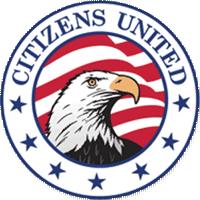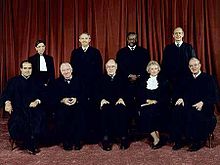Campaign finance laws in the United States have been a contentious political issue since the early days of the union. The most recent major federal law affecting campaign finance was the Bipartisan Campaign Reform Act (BCRA) of 2002, also known as "McCain-Feingold". Key provisions of the law prohibited unregulated contributions to national political parties and limited the use of corporate and union money to fund ads discussing political issues within 60 days of a general election or 30 days of a primary election; However, provisions of BCRA limiting corporate and union expenditures for issue advertising were overturned by the Supreme Court in Federal Election Commission v. Wisconsin Right to Life.

Citizens United is a conservative 501(c)(4) nonprofit organization in the United States founded in 1988. In 2010, the organization won a U.S. Supreme Court case known as Citizens United v. FEC, which struck down as unconstitutional a federal law prohibiting corporations and unions from making expenditures in connection with federal elections. The organization's current president and chairman is David Bossie.

The Federal Election Commission (FEC) is an independent regulatory agency of the United States whose purpose is to enforce campaign finance law in United States federal elections. Created in 1974 through amendments to the Federal Election Campaign Act, the commission describes its duties as "to disclose campaign finance information, to enforce the provisions of the law such as the limits and prohibitions on contributions, and to oversee the public funding of Presidential elections."

The Bipartisan Campaign Reform Act of 2002, commonly known as the McCain–Feingold Act or BCRA, is a United States federal law that amended the Federal Election Campaign Act of 1971, which regulates the financing of political campaigns. Its chief sponsors were senators Russ Feingold (D-WI) and John McCain (R-AZ). The law became effective on 6 November 2002, and the new legal limits became effective on January 1, 2003.
Buckley v. Valeo, 424 U.S. 1 (1976), was a landmark decision of the US Supreme Court on campaign finance. A majority of justices held that, as provided by section 608 of the Federal Election Campaign Act of 1971, limits on election expenditures are unconstitutional. In a per curiam opinion, they ruled that expenditure limits contravene the First Amendment provision on freedom of speech because a restriction on spending for political communication necessarily reduces the quantity of expression. It limited disclosure provisions and limited the Federal Election Commission's power. Justice Byron White dissented in part and wrote that Congress had legitimately recognized unlimited election spending "as a mortal danger against which effective preventive and curative steps must be taken".
A 527 organization or 527 group is a type of U.S. tax-exempt organization organized under Section 527 of the U.S. Internal Revenue Code. A 527 group is created primarily to influence the selection, nomination, election, appointment or defeat of candidates to federal, state or local public office.
The Federal Election Campaign Act of 1971 is the primary United States federal law regulating political campaign fundraising and spending. The law originally focused on creating limits for campaign spending on communication media, adding additional penalties to the criminal code for election law violations, and imposing disclosure requirements for federal political campaigns. The Act was signed into law by President Richard Nixon on February 7, 1972.
McConnell v. Federal Election Commission, 540 U.S. 93 (2003), is a case in which the United States Supreme Court upheld the constitutionality of most of the Bipartisan Campaign Reform Act (BCRA), often referred to as the McCain–Feingold Act.
First National Bank of Boston v. Bellotti, 435 U.S. 765 (1978), is a U.S. constitutional law case which defined the free speech right of corporations for the first time. The United States Supreme Court held that corporations have a First Amendment right to make contributions to ballot initiative campaigns. The ruling came in response to a Massachusetts law that prohibited corporate donations in ballot initiatives unless the corporation's interests were directly involved.
An independent expenditure, in elections in the United States, is a political campaign communication that expressly advocates for the election or defeat of a clearly identified candidate that is not made in cooperation, consultation or concert with; or at the request or suggestion of a candidate, candidate's authorized committee or political party. If a candidate, his/her agent, his/her authorized committee, his/her party, or an "agent" for one of these groups becomes "materially involved", the expenditure is not independent.

The financing of electoral campaigns in the United States happens at the federal, state, and local levels by contributions from individuals, corporations, political action committees, and sometimes the government. Campaign spending has risen steadily at least since 1990.
Nixon v. Shrink Missouri Government PAC, 528 U.S. 377 (2000), was a case in which the Supreme Court of the United States held that their earlier decision in Buckley v. Valeo (1976), upholding federal limits on campaign contributions also applied to state limits on campaign contributions to state offices.
Randall v. Sorrell, 548 U.S. 230 (2006), is a decision by the Supreme Court of the United States involving a Vermont law which placed a cap on financial donations made to politicians. The court ruled that Vermont's law, the strictest in the nation, unconstitutionally hindered the citizens' First Amendment right to free speech. A key issue in the case was the 1976 case Buckley v. Valeo, which many justices felt needed to be revisited.
Issue advocacy ads are communications intended to bring awareness to a certain problem. Groups that sponsor this form of communication are known by several names including: interest advocacy group, issue advocacy group, issue only group, or special interest group. The problems these groups raise awareness of can be either a social or political issue.
Davis v. Federal Election Commission, 554 U.S. 724 (2008), is a decision by the Supreme Court of the United States which held that section 319 of the Bipartisan Campaign Reform Act of 2002 unconstitutionally infringed on candidates' rights as provided by First Amendment.
Citizens United v. Federal Election Commission, 558 U.S. 310 (2010), was a landmark decision of the Supreme Court of the United States regarding campaign finance laws and free speech under the First Amendment to the U.S. Constitution. The court held 5–4 that the freedom of speech clause of the First Amendment prohibits the government from restricting independent expenditures for political campaigns by corporations, including nonprofit corporations, labor unions, and other associations.
McCutcheon v. Federal Election Commission, 572 U.S. 185 (2014), was a landmark decision of the US Supreme Court on campaign finance. The decision held that Section 441 of the Federal Election Campaign Act of 1971, which imposed a limit on contributions an individual can make over a two-year period to all national party and federal candidate committees, is unconstitutional.

FEC v. National Conservative PAC, 470 U.S. 480 (1985), was a decision by the Supreme Court of the United States striking down expenditure prohibitions of the Federal Election Campaign Act of 1971 (FECA), which regulates the fundraising and spending in political campaigns. The FECA is the primary law that places regulations on campaign financing by limiting the amount that may be contributed. The Act established that no independent political action committee may contribute more than $1,000 to any given presidential candidate in support of a campaign.
Shadow campaigns refers to spending meant to influence political outcomes where the source of the money is not publicly disclosed or is difficult to trace. United States campaign finance law has been regulated by the Federal Election Commission since its creation in the wake of the Watergate Scandal in 1975, and in the years following Citizens United v. FEC, there has been a rise in outside special interest groups spending money on political campaigns in the United States. Dark money leaves voters uninformed about important political information and it can obscure potential conflicts of interest for judges and legislators alike.
Federal Election Commission v. Ted Cruz for Senate, 596 U.S. ___ (2022), was a case related to the First Amendment to the United States Constitution. The Supreme Court of the United States struck down section 304 of the Bipartisan Campaign Reform Act of 2002, which limited the amount of money that candidates could be paid on personal loans to their campaign.





